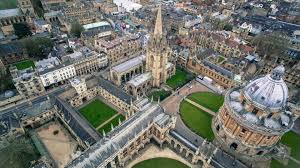University of Cambridge: A Pillar of Academic Excellence and Innovation
The University of Cambridge, located in Cambridge, England, is one of the most prestigious and renowned universities in the world. With a history spanning over 800 years, Cambridge has made an indelible mark on education, research, and culture, shaping the development of knowledge across various disciplines. Known for its rigorous academic programs, world-class faculty, and extraordinary alumni, Cambridge remains a beacon of intellectual achievement and a global leader in higher education.
History and Founding
The University of Cambridge was founded in 1209 by scholars who left the University of Oxford due to a dispute with the local townspeople. Over the centuries, Cambridge quickly grew into a major center for learning and intellectual exchange. The university’s long and storied history includes a rich tradition of scholarship and innovation that has produced many of the world’s most influential thinkers, scientists, writers, and political leaders.
The university is made up of 31 autonomous colleges, each with its own unique history, traditions, and character. These colleges serve as both residential and academic centers, where students live, learn, and engage in intellectual discussions with peers and faculty members. The collegiate system is one of Cambridge’s most distinctive features, offering a blend of personal attention from college tutors and access to the vast resources of the university at large.
Over the centuries, Cambridge has grown from a small academic community into a global powerhouse in research and education, attracting students and scholars from all over the world. The university’s commitment to excellence in both teaching and research has remained a constant throughout its history.
Academic Excellence
Cambridge offers a wide range of undergraduate and graduate programs across numerous fields, from humanities and social sciences to natural sciences, engineering, and medicine. The university is widely regarded for its rigorous academic standards and its focus on developing critical thinking, problem-solving, and analytical skills in students.
The university is consistently ranked among the top universities in the world. It has earned a global reputation for its outstanding research output, its innovative teaching methods, and its commitment to intellectual exploration. Cambridge’s faculty members include some of the most accomplished scholars and researchers in their respective fields, many of whom are leaders in their areas of expertise.
In particular, Cambridge is renowned for its contributions to the sciences and mathematics. The university is the birthplace of groundbreaking discoveries in physics, biology, and chemistry, and it has produced numerous Nobel laureates, including Sir Isaac Newton, Charles Darwin, and Stephen Hawking. The university’s contributions to mathematics are equally significant, with figures such as Alan Turing and G.H. Hardy shaping the development of the field.
Cambridge’s academic programs emphasize personalized learning, with students benefiting from one-on-one supervision from faculty members, as well as small-group tutorials and seminars. This close mentoring relationship between students and tutors is a hallmark of the Cambridge experience, allowing students to engage deeply with their subjects and develop their intellectual abilities.
Research and Innovation
Research is at the heart of the University of Cambridge, and the institution is widely regarded as one of the leading research universities in the world. Cambridge is home to more than 100 research institutes and centers, covering a broad range of disciplines, from the humanities to cutting-edge scientific research.
The university has made significant contributions to some of the most important discoveries in history. In the realm of physics, Cambridge was the site of the discovery of the structure of DNA by James Watson, Francis Crick, and Rosalind Franklin, a breakthrough that revolutionized the field of genetics. The university has also been instrumental in the development of the Higgs boson theory and the search for the fundamental particles of the universe.
In addition to its legacy in the sciences, Cambridge is a leader in fields such as economics, politics, and social sciences. Its business school, the Judge Business School, is known for its innovative research in management and entrepreneurship, while the university’s law faculty is one of the best in the world.
Cambridge encourages interdisciplinary research, allowing scholars from various fields to collaborate and address complex global challenges. Its research efforts focus on tackling pressing issues such as climate change, public health, artificial intelligence, and global security. The university’s commitment to innovation and scientific discovery continues to shape the world we live in.
Global Impact and Alumni
The University of Cambridge’s influence extends far beyond its campus. Its alumni network includes some of the most influential figures in history, from politicians and scientists to writers and business leaders. The university has produced more than 100 Nobel Prize winners, as well as countless other awardees in fields ranging from literature to peace and economics.
Cambridge alumni have had a profound impact on society. Figures such as Sir Winston Churchill, John Maynard Keynes, and Sylvia Plath have left lasting legacies in politics, economics, and literature, respectively. In the world of science, Cambridge graduates like Stephen Hawking, Richard Feynman, and Michael Faraday have shaped our understanding of the universe.
The university’s alumni also include many leaders in the business world, with notable figures such as Lord Alan Sugar, the founder of Amstrad, and Sir James Dyson, the inventor and entrepreneur behind the Dyson company. The global reach of Cambridge alumni further demonstrates the university’s role in shaping the future across various industries and disciplines.
Campus and Facilities
Cambridge’s campus is a blend of historic buildings, modern facilities, and green spaces, offering a unique environment for study and reflection. The university’s colleges, many of which date back centuries, are scattered throughout the city of Cambridge, providing students with an intimate and inspiring atmosphere for learning.
The university’s libraries and museums are world-class, with extensive collections of books, manuscripts, and artifacts. The Cambridge University Library, which houses millions of volumes and rare collections, is a significant resource for students and researchers. The university’s museums, such as the Fitzwilliam Museum and the Museum of Zoology, provide students with access to invaluable collections that support academic study and research.
Cambridge is also home to cutting-edge research facilities, particularly in science and engineering. The Cambridge Institute for Sustainability Leadership, the Cancer Research UK Cambridge Institute, and the Cavendish Laboratory are just a few examples of the state-of-the-art research facilities that enable the university to remain at the forefront of scientific and technological advancements.
Campus Life and Extracurricular Activities
Life at Cambridge is not only about academics; it is also about personal growth and social engagement. The university has a vibrant campus life, with hundreds of student clubs, societies, and organizations catering to a wide range of interests. Whether students are passionate about sports, drama, music, politics, or volunteering, they can find a community that supports their interests.
Cambridge has a strong sporting tradition, with many students participating in both competitive and recreational sports. The university competes in a number of prestigious events, including the annual Boat Race against Oxford, one of the most famous sporting rivalries in the world.
Cultural and artistic activities also play an important role in student life at Cambridge. The university has a thriving arts scene, with students participating in theater productions, music ensembles, and art exhibitions. The Cambridge Union, one of the oldest and most prestigious debating societies in the world, regularly hosts political figures, academics, and thought leaders for debates and talks.
Conclusion
The University of Cambridge stands as a testament to the enduring power of knowledge, innovation, and intellectual curiosity. With its unparalleled academic tradition, world-class faculty, and transformative research, Cambridge continues to lead the way in shaping the future of education and society. As the university continues to inspire generations of scholars, thinkers, and leaders, its legacy of excellence will undoubtedly remain a cornerstone of global higher education for centuries to come.



